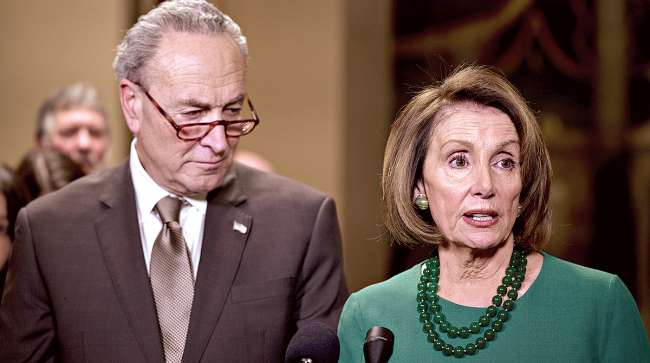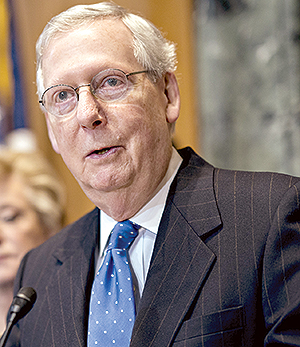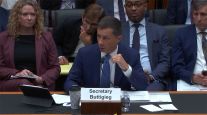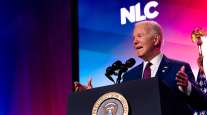Senior Reporter
Trump, Congress Eye Possibility of Infrastructure Bill in 2019

While the new Congress and the White House kick off 2019 in the midst of a partial government shutdown, President Donald Trump and the leadership of the U.S. House and Senate have acknowledged that authorizing funding for infrastructure projects will be atop their legislative priorities.
After it abandoned its infrastructure agenda shortly after proposing a 10-year, $1.5 trillion plan in February 2018, the White House appears ready to try pushing a plan again this year with a divided legislative branch.
Counselor to the president Kellyanne Conway noted the potential for advancing the policy. Speaking to reporters at the White House on Jan. 3, she said, “We see some of the Democrats making joyful noises about infrastructure and keeping the economy humming and hopefully we can rely upon them.”

Senate Majority Leader Mitch McConnell. (Andrew Harrer/Bloomberg News)
Identifying a long-term source of funding for big-ticket construction and maintenance projects, however, remains elusive. Transportation policymakers rejected the president’s plan due to its significant reliance on private sector backing. They continue to disagree on the best approach for securing dollars into a federal highway account headed toward insolvency in less than three years. As Senate Majority Leader Mitch McConnell (R-Ky.) put it after the midterm elections, “The question is how are you going to pay for it and that always becomes very challenging because there’s no sort of easy way to pay for infrastructure without impacting an awful lot of Americans.”
Besides the funding question, the ongoing tense debate over immigration that led Trump to proceed with the partial shutdown also threatens an infrastructure package. If Democrats continue to oppose his efforts for a wall along the southern border, Trump suggested an unwillingness to consider a deal on infrastructure policy in the near future.
The Democrats, who know Steel Slats (Wall) are necessary for Border Security, are putting politics over Country. What they are just beginning to realize is that I will not sign any of their legislation, including infrastructure, unless it has perfect Border Security. U.S.A. WINS! — Donald J. Trump (@realDonaldTrump) December 20, 2018
“The Democrats, who know Steel Slats (Wall) are necessary for Border Security, are putting politics over Country. What they are just beginning to realize is that I will not sign any of their legislation, including infrastructure, unless it has perfect Border Security. U.S.A. WINS!” Trump tweeted Dec. 20.
The president’s threat, however, failed to register with new Speaker of the House Nancy Pelosi (D-Calif.).
“I believe the president wants to do an infrastructure bill. I don’t know that he’ll throw a tantrum over it when he sees what the bill might be. We’ve talked in a very positive way. Almost every conversation I’ve had with him since he’s been president ... has involved how we can work together on infrastructure,” she told reporters Dec. 20.
“It’s something the country wants very much. It’s something he promised in the campaign. So, if he’s keeping campaign promises to the letter, he probably would want to get to work on an infrastructure bill,” Pelosi added.
Democrats took over the House and Republicans kept their power in the Senate after the November elections.
Rep. Peter DeFazio (D-Ore.), incoming chairman of the Transportation and Infrastructure Committee, said he intends to have infrastructure policy legislation ready by summertime. The plan, DeFazio explained, would include a nationwide vehicle-miles-traveled pilot program. It also would include provisions that would boost climate-resilient programs, as well as expand public and smart technology transportation programs.
“There’s ways we could make the existing infrastructure carry people better, while we invest in the new infrastructure,” DeFazio said in December. He is among the few lawmakers supportive of increasing fuel taxes for funding federal infrastructure obligations long-term.

We're between seasons on RoadSigns but have created an intersession season as we get set for 2019. In Episode 1, we ask: How Does Congress Say Trucking? Are the planets finally aligning for movement on infrastructure funding? Hear a snippet above from Kellie Mejdrich of CQ Roll Call, and get the full program by going to RoadSigns.TTNews.com.
The Republican leadership of the transportation panels in the Senate also agree the time is ideal for advancing an infrastructure bill, although they’ve yet to unveil a proposal. Senate Democratic leader Chuck Schumer of New York already proposed expanding funding for severe-weather resiliency in an infrastructure bill for major construction projects.
The proposal responds to the notion that storms will intensify over the years. The force of hurricanes has intensified, with most of the scientific community linking such changes in the climate to human activity.
“We should make massive investments in renewable-energy infrastructure,” Schumer wrote in an editorial. “We also must make our infrastructure more climate-resilient, particularly the electrical grid and our water and wastewater systems.”
Under Republican control, Congress ignored Trump’s 10-year, $1.5 trillion infrastructure proposal, as well as an outline from their former top transportation authorizer, retired Rep. Bill Shuster (R-Pa.).
Transportation stakeholders, such as the U.S. Chamber of Commerce, the American Society of Civil Engineers and the American Association of State Highway and Transportation Officials are telling Congress to advance an infrastructure package in 2019. Raising the 24.4-cents-per-gallon diesel tax and the 18.4-cents-per-gallon gas tax would be an ideal approach for restoring the long-term solvency of the Highway Trust Fund account, stakeholders argue.
“We believe that it is now time for all transportation stakeholders, led by Congress and the president, to begin work on reauthorizing the FAST Act [2015 highway law] and to ensure a smooth transition to the next long-term bill without the need for disruptive extensions,” Carlos Braceras, AASHTO’s president and Utah Department of Transportation’s executive director, told the Senate Environment and Public Works panel prior to the adjournment of the previous Congress.
The FAST Act expires in 2020. Federal fuel taxes were last raised in 1993.




